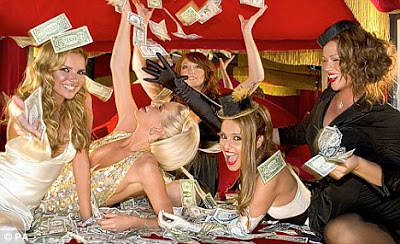Host 1: Welcome to
another exciting episode of “Bankers Gone Wild”. Today we are going to follow the wild hijinks
of J.P. and her two banking buddies Morgan and Jamie as they party in the exotic
Derivative Islands.
Host 2: Yes, the Derivatives are a dangerous, yet exciting,
place for wild bankers to frolic. There
are shark infested waters and many places for naughty financiers to get into
trouble.
Host 1: Looks like
the girls are getting very drunk on a combination of cheap money and greed.
Host 2: Wow, that’s a lot of loose cash. I just hope they are able to control it!
Host 1: Oh no! They’ve started buying! Whoa, look at them buy. It’s like they are just buying anything. Buy, Buy, Buy!
Host 2: Those girls
are really moving that cash! They are awesome!
They are totally out of control!
Host 1: Oh no! They have started to really lose it.
Host 2: Yeah, they are really wasted. Isn’t it great?
Host 1: No, I mean the cash.
They are losing it. They are wasting it big time. This often happens
when investing in the Derivatives.
Host 2: Wow, they are
losing every time! Lose, lose,
lose. Those loses are really racking up!
Host 1: They’ve just blown through a billion dollars! Maybe we should say something.
Host 2: Girls, you’ve
lost a lot. Maybe you should slow down a bit.
Host 1: Oh no! They don’t care. Now their flashing us their
assets!
CENSORED --
CENSORED -- CENSORED
Host 2: Hey, they’re right back at it.
Host 1: Look at all that
cash. It’s flowing right down that rat hole! Lucky rats!
Host 2: Here we go
again. Lose, lose, lose!
Host 1: These bankers have gone super wild!
Host 2: Look, they just blew through their second billion
and now they are lying exhausted on the beach.
Host 1: Hey,
girls. You just lost two billion
dollars in the Derivatives. Aren’t you even a little embarrassed? What do you have to say for yourselves?
Host 2: What’s that? You say it doesn’t matter because you
still have plenty of cash. Oh great,
here we go again. Now they are flashing
us their balance sheets! Look at that
bottom line! Look at those TIPS! (Treasury Inflation-Protected Securities)
CENSORED --
CENSORED -- CENSORED
The Solution
The simple solution is to revert back to how the banks were structured
in the past. Banking operations were separate from investment firms. This set-up worked fine until it was changed and
it has not worked well ever since.
Making this change would:
1. Reduce the size of the major banks in a logical,
non-disruptive, way. To reduce the size
of the banks in other ways would require wise government choices and that of
course is an oxymoron.
2. Really eliminate “too big to fail”. First, the banks would naturally be much
smaller. Second, and more importantly,
the banks would not be able to make the risky investments that could cause them
to fail. The banks would again be safer
and depositors could be confident that their banks would not take major risks
with their money.
3. Allow the investment firms to invest in whatever
risky investments they choose with the money they are able to receive from investors
(their customers). Investors would be
well aware of the risks. If the firms
make bad investments, they lose all their money and go bankrupt. No government bailouts, no congressional
meetings, no hand wringing, just turn out the lights and close up shop. This is the way it is supposed to work.
This would be so simple but the Democrats don’t understand
the financial markets so they are intent in punishing the banks. And the Republicans understand the financial
markets too well and want to write the rules with enough loopholes so that
nothing really changes.
The French Connection
Those stupid Frenchmen.
They are in the middle of an economic crisis and they just elected a
socialist to lead them out of it! Who do
they think they are, California? Ha Ha
Ha Ha Ha! That is just totally
ridiculous. A socialist! How dumb.
The only thing worse than electing a socialist in that situation, would be
to reelect a socialist during a time of economic calamity. That would be
insanely idiotic. Bwahaha, Bwahaha, Bwahaha, hey wait a minute …..


